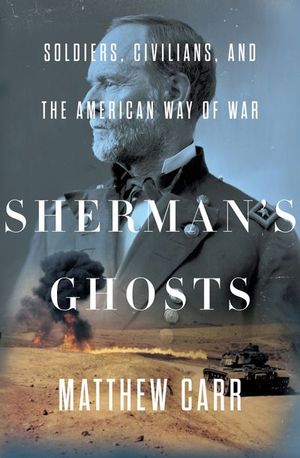Sherman's Ghosts
Published by The New Press
This “thought-provoking” military history considers the influence of General Sherman’s Civil War tactics on American conflicts through the twentieth century (The New York Times).
“To know what war is, one should follow our tracks,” Gen. William T. Sherman once wrote to his wife, describing the devastation left by his armies in Georgia. Sherman’s Ghosts is an investigation of those tracks, as well as those left across the globe by the American military in the 150 years since Sherman’s infamous “March to the Sea.”
Sherman’s Ghosts opens with an epic retelling of General Sherman’s fateful decision to terrorize the South’s civilian population in order to break the back of the Confederacy. Acclaimed journalist and historian Matthew Carr exposes how this strategy, which Sherman called “indirect warfare,” became the central preoccupation of war planners in the twentieth century and beyond. He offers a lucid assessment of the impact Sherman’s slash-and-burn policies have had on subsequent wars and military conflicts, including World War II and in the Philippines, Korea, Vietnam, and even Iraq and Afghanistan.
In riveting accounts of military campaigns and in the words of American soldiers and strategists, Carr finds ample evidence of Sherman’s long shadow. Sherman’s Ghosts is a rare reframing of how we understand our violent history and a call to action for those who hope to change it.
“To know what war is, one should follow our tracks,” Gen. William T. Sherman once wrote to his wife, describing the devastation left by his armies in Georgia. Sherman’s Ghosts is an investigation of those tracks, as well as those left across the globe by the American military in the 150 years since Sherman’s infamous “March to the Sea.”
Sherman’s Ghosts opens with an epic retelling of General Sherman’s fateful decision to terrorize the South’s civilian population in order to break the back of the Confederacy. Acclaimed journalist and historian Matthew Carr exposes how this strategy, which Sherman called “indirect warfare,” became the central preoccupation of war planners in the twentieth century and beyond. He offers a lucid assessment of the impact Sherman’s slash-and-burn policies have had on subsequent wars and military conflicts, including World War II and in the Philippines, Korea, Vietnam, and even Iraq and Afghanistan.
In riveting accounts of military campaigns and in the words of American soldiers and strategists, Carr finds ample evidence of Sherman’s long shadow. Sherman’s Ghosts is a rare reframing of how we understand our violent history and a call to action for those who hope to change it.
BUY NOW FROM
COMMUNITY REVIEWS

